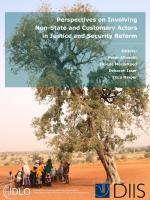Perspectives on involving non-state and customary actors in justice and security reform
Focusing on the role of non-state and customary actors in security and justice reform, the book engages with one of the central debateson international development intervention in fragile states. It does so by questioning the key pillar of such interventions: state-building. Written by both practitioners and academics, the contributions suggest that international development programming should focus on "what works" and what is seen as legitimate justice and security by ordinary citizens, rather than on "what ought to be", based on Western normative frameworks. This means engaging with the variety of justice and security actors that already exist and are used by local citizens, rather than trying to build something entirely new. In the majority of contexts this implies a move away from the dominant state-centric approach, which focuses on building formal state institutions or on 'fixing' those that have failed.
The crux of the matter is that non-state actors, such as customary leaders, are the primary providers of justice and security in the Global South. They deal with an estimated 80 to 90 percent of disputes. This is an empirical reality that needs to be taken serious: even if state institutions did work as intended, they would unlikely fulfill the same justice needs as their non-state counterparts. A more pluralistic framework, which is both context-sensitive and evidence-based, is therefore a welcomed alternative to mainstream state-building.
Another key argument of the book is the need to bring politics into the center of program design and implementation. Not only are justice and security provision inherently political arenas where power, resources and rights are at stake, international agencies' engagement with them also have significant political implications.
The chapters that appear in this electronic volume were presented at a conference organized byDIIS, the Danish Institute for International Studies (DIIS). It was supported financially by the Ministry of Foreign Affairs of Denmark with additional funding from the International Development Law Organization (IDLO). The conference was entitled “Access to Justice and Security: Non-state actors and the local dynamics of ordering”.
DIIS Experts



